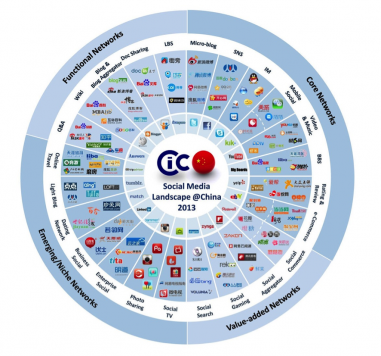Written by Xisi Dai
Following the line of the previous article on the search engines preferred by the Chinese, we decided to delve into the world of social networks as well. If you thought that Twitter, Youtube or Facebook were the leaders from Lima to Beijing, you were wrong because in China, they have their own social network counterparts.
A few facts before we start
Before I start commenting on social networks in China, I would like to point out a few facts because although this Asian giant is special in terms of its idiosyncrasy, its volume of users does not go unnoticed either.
China has 567 million social network users.
Chinese users spend an average of 46 minutes a day browsing social networks. In terms of age segmentation, 26-30 year-olds are the most frequent users (30%), with male netizens (57%) outnumbering female users (43%). the percentage of Internet users who have an account on a social network, China surpasses the US with 91%, while the figure for the latter is 67%. We can say that the Chinese are big fans of social networks.
Facebook, Twitter and Youtube in China?
The answer to this big question is it depends. There are several aspects to keep in mind when we talk about social networks in China since:
- In mainland China (People’s Republic of China) Facebook, Twitter, Youtube and Google+ are blocked.
- In Hong Kong and Taiwan the above pages are available but compete with other domestic social networks tailored to their tastes.
- Unlike in the “Western” world, where Facebook and Twitter dominate the industry, in China there are a large number of competing social networking sites that are competing for the top spot.
At this point, we can say that in mainland China Facebook, Twitter and Youtube have fewer users than domestic social networking sites. However, it should be noted that most of the foreigners living there and the Chinese who have, or wish to have, the most contact with foreigners use Facebook regularly. That’s right, clandestinely and through virtual private networks or VPNs.
One piece of good news for these users is that in September this year, thanks to the establishment of the Shanghai Free Trade Zone, a reserved area has been opened for unrestricted access to Western social networks. The evolution of its use will have to be observed.
China’s favorite social networks
This pie chart, published in April this year by CIC, the leading observatory of social networks, shows what we were saying earlier about the multiplicity and competition of Chinese social networks.

Within this multitude of services, we note that in terms of volume of users, the SNS (social networking service) and micro-blogging services stand out.
Among SNSs, Qzone tops the list with more than 712 million users, followed by PengYouWan (“friend network“, in its Chinese translation), with around 259 million users. These two social networks belong to the same company: Tencent.

The first two are followed by RenRenWan (translated as “the network of the whole world“, with 172 million users) and KaiXinWan (“the cheerful network“, with 113 million users). These two pages are a carbon copy of Facebook, the first one was created for the university environment and the applications of the second one are very similar to those of Facebook.

In terms of micro-blogging sites in China, we have Tencent Weibo, with 507 million users, which has ousted Sina Weibo(500 million), the hybrid network between Twitter and Facebook that has topped the list of the top social networks in recent years.

They are networks for sharing music and videos, but in addition to that, they have programs and TV series in streaming, as well as some movies, all totally free of charge.
Finally, as for other networks that are emerging, we highlight Weixin (also a product of Tencent) known in Spain as WeChat and UshiWan, a network similar to LinkedIn. The former acts as a WhatsApp replacement that comes with some features similar to an SNS applications with wall and user profile. The second is a network of professionals with more than 400 million users who use it under the slogan “Ushi, my connections, my advantages“.
